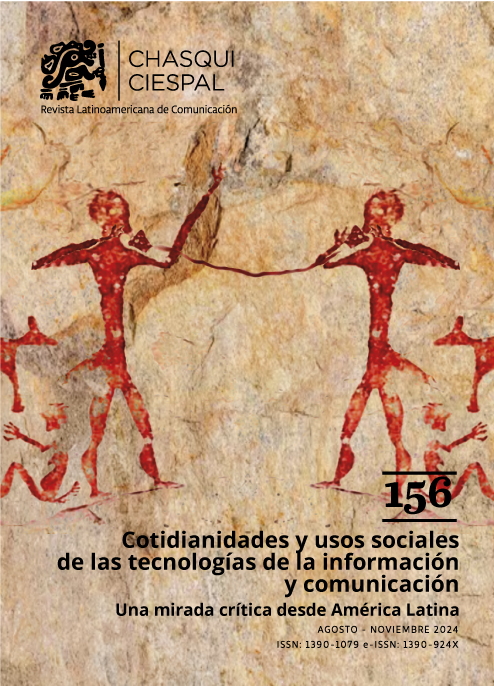Jiji, Jaja, Sabotaje y Campaña Sucia: WhatsApp en las Elecciones Presidenciales Chilenas de 2021
DOI:
https://doi.org/10.16921/chasqui.v1i156.5054Keywords:
comunicación política, prácticas antidemocráticas, política sucia, desinformaciónAbstract
Esta investigación estudia la ‘política sucia’ entre polos opuestos y antagónicos, durante las elecciones presidenciales de Chile en 2021. Se analizan datos en grupos públicos de mensajería en WhatsApp, usando métodos computacionales, análisis cualitativo y una entrevista a un informante clave de la campaña de uno de los candidatos. Los resultados apuntan hacia tácticas 'sucias', como desinformación e ingeniería social, pero también sabotaje técnico, con la obstrucción deliberada de los grupos de campaña, predominantemente desde la derecha contra la izquierda.References
Alenda, S. (2023). Batallas y reconfiguraciones en la derecha chilena. Nueva Sociedad, (305), 146-156.
Anwar, A., Ilyas, H., Yaqub, U., & Zaman, S. (2021, junio). Analyzing QAnon on Twitter in context of US elections 2020: Analysis of user messages and profiles using Vader and BERT topic modeling. En DG. O2021: The 22nd Annual International Conference on Digital Government Research (pp. 82-88).
Atria, J., Amenábar, J., Sánchez, J., Castillo, J. C., & Cociña, M. (2017). Investigando a la élite económica: Lecciones y desafíos a partir del caso de Chile. Cultura-Hombre-Sociedad, 27(2), 5-36. https://dx.doi.org/10.7770/cuhso-v27n2-art1244.
Bennett, W. L., & Segerberg, A. (2012). The logic of connective action: Digital media and the personalization of contentious politics. Information, communication & society, 15(5), 739-768.
Caro, I., & Quitral, M. (2023). La nueva derecha radical chilena en el contexto internacional: auge e ideología. Política y Sociedad, 60(1).
Casero-Ripollés, A., Tuñón, J., & Bouza-García, L. (2023). The European approach to online disinformation: geopolitical and regulatory dissonance. Humanities and Social Sciences Communications, 10(1), 1-10.
Counter Extremism Project (CEP). (2017). Terrorists on Telegram. CEP https://www.counterextremism.com/terrorists-on-telegram
Delli Carpini, M. X., & Keeter, S. (1996). What Americans Know about Politics and Why It Matters. Yale University Press.
Dos Santos, J. G. B., Freitas, M., Aldé, A., Santos, K., & Cunha, V. C. C. (2019). WhatsApp, política mobile e desinformação: a hidra nas eleições presidenciais de 2018. Comunicação & Sociedade, 41(2), 307-334.
Garimella, K., & Eckles, D. (2020, 7 de julio). Images and misinformation in political groups: Evidence from WhatsApp in India. Misinformation Review, 1(5), 1-12. https://doi.org/10.37016/mr-2020-030
Gillespie, T. (2010). The politics of ‘platforms’. New media & society, 12(3), 347-364.
Jamieson, K. H. (1992). Dirty politics: Deception, distraction and democracy. New York, NY, & Oxford, UK: Oxford University Press.
Johns, A. (2020). ’This will be the WhatsApp election’: Crypto-publics and digital citizenship in Malaysia’s GE14 election. First Monday, 25(12). https://doi.org/10.5210/fm.v25i12.10381
Johnson, S. (2012). Emergence: The Connected Lives of Ants, Brains, Cities, and Software. Scribner.
Lau, R. R., & Pomper, G. M. (2004). Negative campaigning: An analysis of US Senate elections. Rowman & Littlefield.
Mansfield-Devine, S. (2018). Hacking democracy: abusing the Internet for political gain. Network Security, 2018(10), 15-19.
Mendoza, M., Providel, E., Santos, M., & Valenzuela, S. (2024). Detection and impact estimation of social bots in the Chilean Twitter network. Scientific Reports, 14(1), 6525. https://doi.org/10.1038/s41598-024-57227-3
Milan, S., & Barbosa, S. (2020). Enter the WhatsApper: Reinventing digital activism at the time of chat apps. First Monday, 25(12). https://doi.org/10.5210/fm.v25i12.10414
Mitchelstein, E., Matassi, M., & Boczkowski, P. J. (2020). Minimal Effects, Maximum Panic: Social Media and Democracy in Latin America. Social Media + Society, 6(4). https://doi.org/10.1177/2056305120984452
Mosca, G. (1984). La clase política (The Political Class). México: Fondo de Cultura Económica.
Nercesian, I., & Mendoza, M. (2021). Empresariado y poder político: PPK y Piñera (2010-2018). Revista Mexicana de Sociología, 83(1), 73-102.
Newman, N., Fletcher, R., Eddy, K., Robertson, C. T., & Nielsen, R. K. (2023). Digital news report 2023. Reuters Institute for the Study of Journalism. https://reutersinstitute.politics.ox.ac.uk/sites/default/files/2023-06/Digital_News_Report_2023.pdf
Ossandón, J. (2013). Hacia una cartografía de la elite corporativa en Chile. En J. Ossandón & E. Tironi (Eds.), Adaptación: La empresa chilena después de Friedman (pp. 29-54). Universidad Diego Portales.
Ozawa, J. V. S., Woolley, S. C., Straubhaar, J., Riedl, M. J., Joseff, K., & Gursky, J. (2023). How Disinformation on WhatsApp Went From Campaign Weapon to Governmental Propaganda in Brazil. Social Media + Society, 9(1). https://doi.org/10.1177/20563051231160632
Pelfini, A. (2022). ¿Son o se hacen?: las élites empresariales chilenas ante el cuestionamiento ciudadano. Ediciones Universidad Alberto Hurtado.
Quandt, T. (2018). Dark participation. Media and Communication, 6(4), 36-48.
Salazar, G. (2019, octubre). El «reventón social» en Chile: Una mirada histórica. Nueva Sociedad.
Saldaña, M., & Rosenberg, A. (2020). I don’t want you to be my president! Incivility and media bias during the presidential election in Chile. Social Media + Society, 6(4), 2056305120969891.
Santos, F. L. B. dos (2020). Além do PT: a crise da esquerda brasileira em perspectiva latino-americana. Editora Elefante.
Treré, E. (2020). The banality of WhatsApp: On the everyday politics of backstage activism in Mexico and Spain. First Monday, 25(12). https://doi.org/10.5210/fm.v25i12.10404
Treré, E. (2016). The dark side of digital politics: Understanding the algorithmic manufacturing of consent and the hindering of online dissidence. IDS Bulletin, 47(1), 127–138. https://doi.org/10.19088/1968-2016.111.
Walter, A. S., & Nai, A. (2015). Explaining the use of attack behavior in the electoral battlefield: A literature overview. En New perspectives on negative campaigning: why attack politics matters (pp. 135-153).
Wardle, C., & Derakhshan, H. (2017). Information disorder: Toward and interdisciplinary framework for research and policymaking. https://edoc.coe.int/en/media/7495-information-disorder-toward-an-interdisciplinary-framework-for-research-and-policy-making.html
Zelenkauskaite, A. (2022). Creating chaos online: Disinformation and subverted post-publics. University of Michigan Press.
Zuckerman, E. (2014). New media, new civics?. Policy & Internet, 6(2), 151-168.
Downloads
Published
Issue
Section
License
- Authors retain copyright and grant the journal right of first publication with the work simultaneously licensed under a Creative Commons Attribution-NoDerivs License (CC BY-ND) that allows others to share the work with an acknowledgement of the work's authorship and initial publication in this journal.
- Authors are able to enter into separate, additional contractual arrangements for the non-exclusive distribution of the journal's published version of the work (e.g., post it to an institutional repository or publish it in a book), with an acknowledgement of its initial publication in this journal.
- Authors are permitted and encouraged to post their work online.

